World News

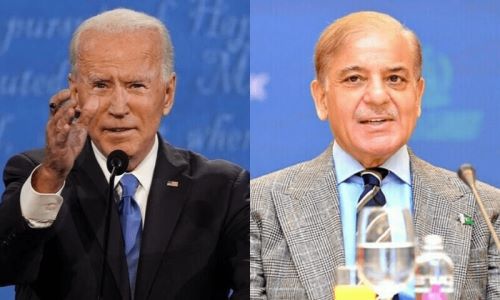
WASHINGTON: Pakistan-facing US experts noted on Friday that President Joe Biden’s letter to Prime Minister Shehbaz Sharif was a gesture not extended to his predecessor, Imran Khan.
However, they also pointed out that Mr Biden did not congratulate Mr Sharif for assuming power or winning the election.
“What distinguishes this anodyne message to the Pakistani leadership is the absence of any reference to the elections that Assistant Secretary Donald [Lu] testified recently could not be characterised as free and fair,” said Shuja Nawaz, who is associated with the South Asia Centre at the Atlantic Council, Washington.
“What should the people of Pakistan expect from the US president on that issue?” Mr Nawaz asked, adding, “This may further estrange the diaspora Pakistanis who expect the US to support a visible and verifiable review of those election results that reek of manipulation after polling.”
Expert says letter ‘skilfully avoids’ all meaningful issues in US-Pakistan relations
According to Mr Nawaz, this letter must be seen in the context of the reality of US aid requested for Pakistan in recent years, which has been gradually reducing. In fiscal 2022, it was $218 million, which reduced to $136m in fiscal 2024 and may further decrease in 2025.
“Pakistan needs substantial economic and military assistance directly from the United States, in addition to critical aid from international financial institutions where the US holds sway,” he said. “These small numbers don’t represent the kind of aid that will improve the lives of its 245 million citizens.”
Michael Kugelman, the director of the Wilson Centre’s South Asia Institute, focused on the letter’s impact on Pakistan’s domestic politics. “The biggest thing that stands out is it’s a message that Imran Khan never received as PM,” he said.
He also noted that the letter “is not a note of congratulation, whether for the election or for assuming power”. He added, “It strikes me as a fairly routine missive that pledges to continue partnership with Pakistan in the areas that have marked bilateral relations post-US Afghanistan withdrawal.”
Mr Kugelman, however, emphasised that it’s an important letter. “To be sure, though, the fact that it’s the US president that is offering this message makes it far from routine,” he noted.
Murtaza Haider, a professor at Toronto Metropolitan University, observed that the letter “skilfully avoids all meaningful matters that concern US-Pakistan relations”.
He argued that while focusing on climate change in Pakistan, the letter should have addressed security and political instability challenges.
“It makes no commitment to Pakistan in financial or other support, while it ignores the political turmoil resulting from the controversial elections on February 8,” he said. “If the Sharif government was looking for an endorsement, this letter certainly isn’t.”
Uzair Younus, a non-resident senior fellow and the former director of the Pakistan Initiative at the Atlantic Council’s South Asia Centre, pointed out that President Biden’s letter focuses on themes American diplomats have identified as priorities.
“But what stands out is that Biden has not found it necessary to congratulate the prime minister on winning the elections,” he said. “The letter does focus on regional challenges, which can surely be interpreted to include terrorism, but does not explicitly call out this topic.”
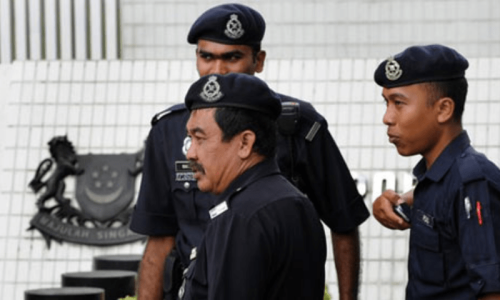
Malaysian authorities have arrested three people suspected of supplying firearms to a 36-year-old man carrying an Israeli passport, who was detained this week at a hotel in Kuala Lumpur, police said on Saturday.
The man, arrested with a bag containing six handguns and 200 bullets, had arrived at Kuala Lumpur International Airport from the United Arab Emirates on March 12 using what authorities believed to be a fake French passport, Inspector-General of Police Razarudin Husain told a press conference late on Friday.
The suspect turned over an Israeli passport upon questioning by police, Razarudin said, adding that the man, who has not been publicly identified, had ordered the weapons after arriving in Malaysia and paid for them with cryptocurrency.
The Israeli embassy in Singapore did not immediately respond to an emailed request for comment. Malaysia and Israel do not have diplomatic relations.
Police did not rule out the possibility that the man could be a member of Israeli intelligence, though the suspect told authorities he had entered Malaysia to hunt down another Israeli citizen due to a family dispute.
“We do not fully trust this narrative as we suspect there may be another agenda,” Razarudin said, adding that the man had stayed at several hotels while in Malaysia.
Three Malaysians, including a married couple, were arrested on Friday and have been remanded for seven days on suspicion of supplying weapons and acting as drivers for the Israeli suspect, Razarudin told Reuters on Saturday.
A pistol was retrieved from a car belonging to the couple, he added.
Authorities have been put on high alert following the man’s arrest, with security beefed up for Malaysia’s king, Prime Minister Anwar Ibrahim and other high-level figures.
Malaysia, a majority-Muslim country, is a staunch supporter of the Palestinians and has criticised Israel’s campaign in Gaza. Malaysia is home to around 600 Palestinian refugees, according to the UN refugee agency.
In 2018, a Palestinian scientist was shot dead in the Malaysian capital by two unidentified men in a killing that Hamas suggested was carried out by Israel’s Mossad intelligence service. Israel denied the allegations.
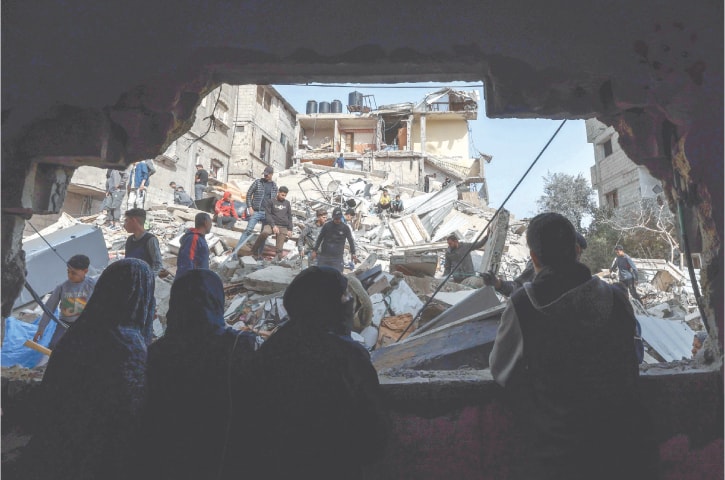
GAZA STRIP: Israel bombed at least four homes in Rafah on Wednesday, raising fresh fears among the more than a million Palestinians sheltering in the last refuge on the southern edge of the Gaza Strip that a long-threatened ground assault could be coming.
One of the airstrikes killed 11 people from a single family, health officials said.
The health ministry said on Wednesday that at least 32,490 people have been killed in the territory during more than five months of war between Israel and Hamas.
The toll includes at least 76 deaths over the past 24 hours, a ministry statement said, adding that 74,889 people have been wounded in the Gaza Strip since the Israeli invasion began on October 7.
Fighting has raged since last week around Gaza City’s Al-Shifa Hospital, the territory’s largest, and more recently near two hospitals in the main southern city of Khan Yunis, Al-Amal and Nasser.
Israeli tanks and armoured vehicles have also massed around the Nasser Hospital, the Gaza health ministry said, adding that shots were fired but no raid had yet been launched.
The Palestinian Red Crescent warned that thousands were trapped inside and “their lives are in danger”.
Talks in Qatar towards a truce and prisoner release deal, involving US and Egyptian mediators, have brought no result so far, with Israel and Hamas blaming each other.
Disdain for UN resolution
One of Wednesday’s airstrikes killed 11 people from a single family, health officials said.
Mussa Dhaheer, looking on from below as neighbours helped an emergency worker lower a victim in a black body bag from an upper storey, said he had awakened to the blast, kissed his terrified daughter, and rushed outside to find the destruction. His father, 75, and mother, 62, were among the dead.
“I don’t know what to do. I don’t know what to say. I can’t make sense of what happened. My parents. My father with his displaced friends who came from Gaza City,” he told Reuters. “They were all together, when suddenly they were all gone like dust.”
At another bomb site, Jamil Abu Houri said the intensification of air strikes was Israel’s way of showing its disdain for a UN Security Council resolution last week demanding an immediate Israel-Hamas ceasefire.
Next up, he fears a ground assault on Rafah, which Israel has threatened for weeks to carry out despite pleas from its closest ally Washington that this would wreak a humanitarian disaster.
“The bombing has increased, and they have threatened us with an incursion, and they say that have been given the green light for the Rafah incursion. Where is the Security Council?” Abu Houri said.
“Look at our little ones. Look at our children. Where should we go? Where should we go?” Another Israeli airstrike in Rafah on Wednesday afternoon killed four Palestinians including a woman and a child and injured other residents, Gaza health authorities said.
Just west of Gaza City in the enclave’s north, seven people were killed in an airstrike on a house, health officials said.
US, UK sanction media channel
In a relevant development, US and UK authorities unveiled sanctions against two people and three companies related to the popular media channel Gaza Now over its fundraising efforts, allegedly in support of Hamas.
The Treasury Department said in a statement that Gaza Now, whose popular Telegram channel has more than 1.8 million followers, and its founder Mustafa Ayash, started fundraising for Hamas after October 7.
“The UK Government has announced a full asset freeze against two individuals suspected of providing financial support for Gaza Now,” the UK Treasury said in a statement.
“All funds and economic resources in the UK belonging to or controlled by Sultana and Ayash have been frozen,” they added.
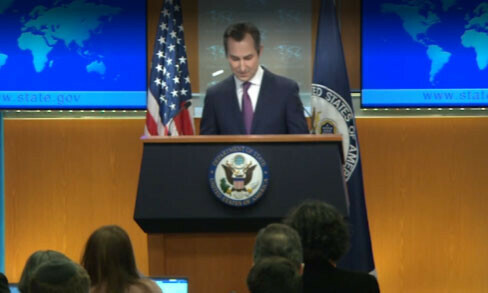
The United States has stated that “helping Pakistan address its energy shortage crisis is a priority” for Washington.
The Pakistan-Iran gas pipeline is a long-term project between Tehran and Islamabad, and has faced delays and funding challenges for several years. In February, the government had decided to start building an 80-kilometre segment of the pipeline, extending from the Iranian border to Gwadar, to ward off $18bn potential penalties from Tehran.
On Tuesday, Washington had said that it did not support the gas pipeline project from going forward and cautioned about the risk of sanctions in doing business with Tehran.
The remarks had come after Petroleum Minister Musadik Malik had said that Islamabad would seek exemption from US sanctions over the gas pipeline project.
“We will seek exemption from US sanctions. Pakistan cannot afford sanctions in the gas pipeline project,” Malik had told journalists during an informal chat.
This was in contrast to the stance put forward by the Foreign Office, whose spokesperson told a press briefing last week that there was no room for any discussion or waiver from a third party.
The issue had become a hot topic after US diplomat Donald Lu, during a detailed testimony before a US House subcommittee , said that Washington was committed to preventing the construction of the pipeline. It was here that Lu noted that Islamabad had not applied for a waiver for any US sanctions that may be attracted by the project.
In a press briefing on Wednesday, US State Department’s spokesperson Matthew Miller was asked about the US warning regarding the pipeline as the reporter highlighted that “it seems like United States left it at nowhere to meet up with energy crisis”.
In his response, Miller said that helping Pakistan address its energy shortage crisis was “a priority for the United States”.
“We have supported the addition of approximately 4,000 megawatts of clean energy capacity in Pakistan. Our projects have dramatically increased the nation’s electricity capacity, today powering the homes of millions of Pakistanis,” he said.
“Additionally, through the United States-Pakistan Green Alliance — a transformative initiative between our two countries — we are working together to address today’s most pressing environmental challenges, especially around water management, climate-smart agriculture, and renewable energy,” he said
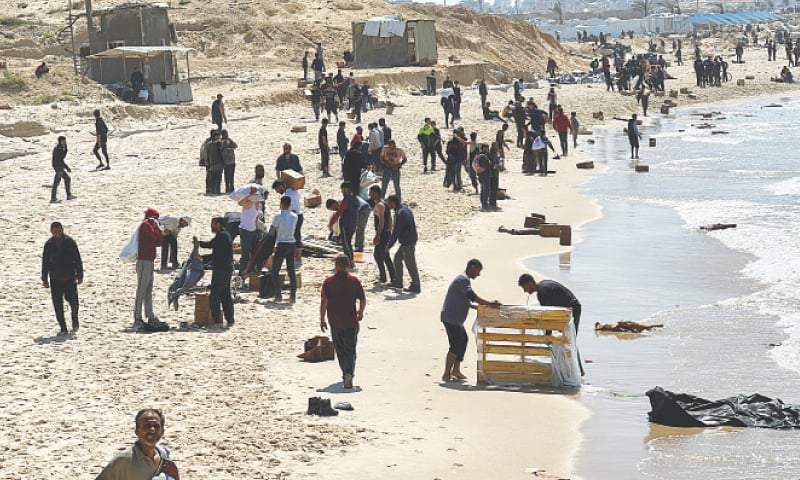
GAZA STRIP: Twelve people drowned and at least six were killed in stampedes trying to recover aid airdropped into Gaza, local authorities said on Tuesday.
The deaths occurred in the north of the besieged territory on Monday, with people rushing to collect packages dropped from planes along Gaza’s Mediterranean coast.
The UN humanitarian office called on Tuesday for Israel to revoke a ban on food deliveries to northern Gaza from the UN Palestinian refugee agency UNRWA, saying people there were facing a “cruel death by famine”.
Israel had earlier said it would stop working with UNRWA in Gaza, accusing the aid agency of perpetuating conflict. The agency said Israel told it that it would no longer approve its food convoys to north Gaza. Four such requests were denied since March 21, it said.
“The decision must be revoked,” United Nations Office for the Coordination of Humanitarian Affairs (OCHA) spokesperson Jens Laerke told a UN briefing in Geneva. “You cannot claim to adhere to these international provisions of law when you block UNRWA food convoys.”
A UN-backed report this month said famine was imminent and likely to occur by May in northern Gaza.
James Elder, spokesperson for the UN children’s agency Unicef in Gaza, described seeing “paper thin” children in a hospital in northern Gaza and incubators full of underweight babies from malnourished mothers.
“Tens of thousands of people crowd the streets,” he told the same briefing, describing his latest visit to the north on Monday. “They make that universal signal of hand to mouth desperately asking and seeking for food.
“Life-saving aid is being obstructed. Lives are being lost. I saw children whose malnutrition state was so severe, skeletal,” he said.
Other aid agencies also deliver food parcels to northern Gaza, although UNRWA is the biggest provider.
Protecting Palestinians
In Washington, US Defence Secretary Lloyd Austin said on Tuesday that it was a moral and strategic imperative to protect Palestinian civilians in Gaza, and that the humanitarian catastrophe in the besieged enclave was getting worse.
He was speaking at the start of a meeting with Israel Defense Minister Yoav Gallant at the Pentagon as relations between US President Joe Biden and Israeli Prime Minister Benjamin Netanyahu sank to a wartime low.
“In Gaza today, the number of civilian casualties is far too high and the amount of humanitarian aid is far too low,” Austin said.
“Gaza is suffering a humanitarian catastrophe and the situation is getting even worse,” Austin said, using more forceful language than he has in the past on the crisis.
He added that he and Gallant would discuss how to ease the humanitarian crisis in Gaza.
Fighting rages on
On the ground in Gaza, the fighting raged on unabated, with Israeli operations in and around at least three major hospitals in the besieged territory.
The Israeli military said its jets had struck more than 60 targets in Gaza in the past day, including what it claimed to be tunnels, infrastructure and military structures.
Gaza’s health ministry said 70 people were killed early Tuesday, 13 of them in Israeli air strikes around the southern city of Rafah.
Dozens of Israeli tanks and armoured vehicles surrounded the Nasser Hospital in the southern city of Khan Yunis, where thousands of displaced people have sought refuge, witnesses said.
The health ministry said shots were being fired around the sprawling complex, but no raid had yet taken place.
At Gaza City’s Al-Shifa Hospital, the territory’s largest, Israeli troops have been involved in heavy fighting for the past nine days. Israel claims to have killed 170 Palestinian militants and arrested hundreds of others.
Doha talks at ‘dead end’
Meanwhile, Israel recalled its negotiators from Doha after deeming mediation talks on a Gaza truce “at a dead end” due to Hamas demands, a senior Israeli official told Reuters on Tuesday.
The official accused Hamas leader Yahya Sinwar of sabotaging the diplomacy “as part of a wider effort to inflame this war over Ramazan”.
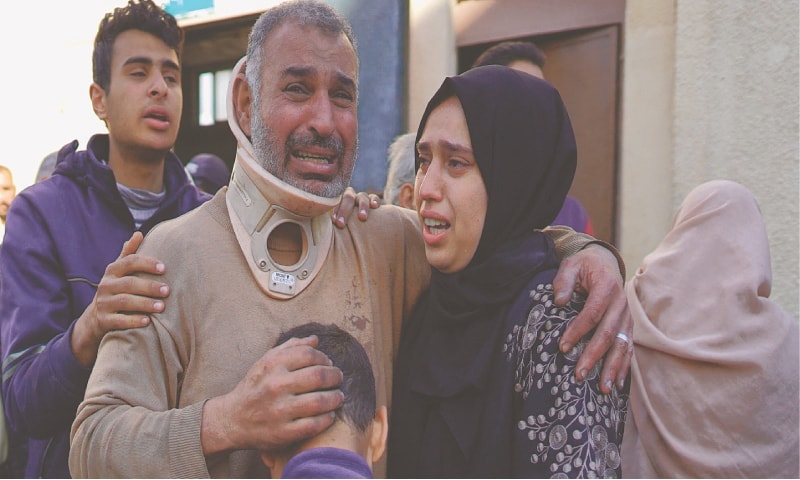
GAZA STRIP: Israeli forces fought fighters in besieged Gaza on Monday including around at least two major hospitals, raising fears for the patients, medics and displaced people trapped inside.
Troops and tanks have encircled Gaza City’s Al-Shifa Hospital, the territory’s biggest, for a week and more recently moved on the Al-Amal Hospital in the main southern city of Khan Yunis.
While Israel has labelled its operations “precise” and said it has taken care to avoid harm to civilians, aid agencies have voiced alarm about civilians caught up in the fighting.
UN chief Antonio Guterres, on a crisis visit to the Middle East, has pleaded for an end to the “non-stop nightmare” for the 2.4 million people trapped in Gaza’s worst-ever crisis.
As Israel’s top ally the United States has also voiced rising concern. US Vice President Kamala Harris stressed on ABC TV that a Rafah invasion would be “a huge mistake” and, when asked whether she would rule out “consequences” for Israel, replied that “I am ruling out nothing”.
‘We are suffering’
The health ministry in the Gaza Strip put the total Palestinian death toll at 32,333, most of them women and children. Bombardment and fighting in Gaza killed another 72 people overnight, according to the ministry.
More than 50 airstrikes rained down on the Gaza Strip, said the Hamas government press office.Food and water shortages have deepened the suffering, especially in northern Gaza where residents, mostly women and children, were waiting in line to fill up jerrycans and buckets in Jabalia.
Palestinians living near Al Shifa report hellish conditions, including corpses in the streets
“We don’t even have food to give us the energy to go to collect the water — let alone the innocent children, women and the elderly,” said one man, Bassam Mohammed al-Haou.
Another local man, Falah Saed, said “we are suffering a lot from water shortages because all and pipes and pumps have stopped working since the beginning of the war”.
Hospital battles
Palestinians living near Al Shifa have reported hellish conditions, including corpses in the streets, constant bombardment and the rounding up of men, who are stripped to their underwear and questioned.
The Al Shifa raid was in its eighth day and the military reported detaining some 500 people. Israel has said the operation will continue until the last militant is “in their hands”, signalling an extended presence at Al Shifa, which troops also raided in November.
At Al Amal Hospital, the Palestinian Red Crescent said Israeli forces had surrounded all entrances and prohibited hospital staff from leaving.
The military said its Al Amal operation included “raids on several terrorist infrastructure sites in the area and located explosive devices, RPGs (rocket-propelled grenades) and military equipment”.
The Red Crescent said military vehicles had also surrounded the nearby Nasser hospital, but the situation there remained unclear.
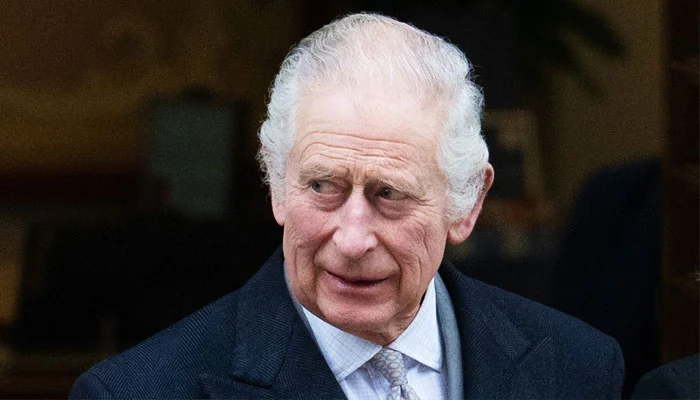
King Charles is reportedly gearing up to lead the Royal family at the church service on Easter and will be delivering a powerful Easter message for the public.
The monarch wants to provide “reassurance” to the public as he seeks to bring the nation and the Royal family together after back-to-back health crisis of senior royal members.
A source revealed to The Express, “The King wants to reassure the public over the Easter weekend and is very much hoping to be able to lead the Royal Family at the church service on Sunday.”
Commenting on the matter, royal commentator Richard Fitzwilliams claimed that Charles’ message would focus on “the spiritual on this significant religious anniversary.”
"His message, released at the Royal Maundy Thursday service, a favourite event of the late Queen, assumes a new importance at this unpredictable time,” he said.
"The message from the King will focus on the spiritual on this significant religious anniversary, but he is likely to personalise it too.
“Catherine, in her video message, talked of focusing on 'the things which will help me heal, in my mind, body and spirit',” the expert told the publication.
"This is an unprecedented opportunity, unique to the royal family, to get across some positive ideas in a world where the lives of so many are marred by illness and conflict.”
Referring to the heartfelt video message of Kate Middleton in which she announced of her cancer, the expert said, "Catherine stressed the pivotal importance of the family, especially in tough times and this is a possible theme for the King’s message at a highly pressured time for the royal family.”
“The challenges facing them are also facing a great many others," Fitzwilliams shared.
He went on to add that the King Charles knows the significance “attached to being seen” and is “reportedly hoping to attend the annual Easter service at Windsor.”
“Last year the royal family were out in force, this year numbers will be limited but interest, usually minimal compared to their appearance at Christmas, will be worldwide."


